|
|
|
Sort Order |
|
|
|
Items / Page
|
|
|
|
|
|
|
| Srl | Item |
| 1 |
ID:
123333


|
|
|
|
|
| Publication |
2013.
|
| Summary/Abstract |
We analyze the factors affecting the decisions of Chinese firms to take on debt in the form of either bonds or syndicated loans over the period of 2006-2010. The study reveals the extent to which corporate debt choices are politically or economically driven. We test if central government ownership, flotation costs, asymmetries of information, and renegotiation and liquidation costs influence the choice of debt. We find evidence in favor of the influence of central government ownership on the financing choices of firms because Central State owned firms are more likely to issue bonds and to borrow uniquely on the bond market, rather than tapping both debt markets. Overall, our findings show that financial factors play a much more minor role in corporate debt choices compared to other countries, whereas central government ownership is a key determinant of preference for the bond market.
|
|
|
|
|
|
|
|
|
|
|
|
|
|
|
|
| 2 |
ID:
159038
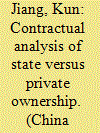

|
|
|
|
|
| Summary/Abstract |
We uniquely analyze the advantages and disadvantages of private ownership versus state ownership under various circumstances by focusing on three aspects: external risk, internal governance, and relative importance of owners versus managers. Our theoretical analysis indicates that private ownership is better than state ownership if the business environment is risky, corruption is limited, or the manager plays a more important role than the owner. Our empirical analysis supports our theoretical findings and reveals that better internal governance, more external risk and greater importance of the manager will magnify the benefits of privatization.
|
|
|
|
|
|
|
|
|
|
|
|
|
|
|
|
| 3 |
ID:
159069
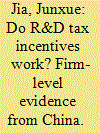

|
|
|
|
|
| Summary/Abstract |
Tax incentives have been used worldwide to encourage firm R&D, but there is little evidence on their effectiveness as a policy tool in developing countries. We use a panel dataset of Chinese listed companies covering 2007 to 2013 to assess the effects of tax incentives on firm R&D expenditures and analyze how institutional conditions shape these effects. Our results show that tax incentives motivate R&D expenditures for our sample firms. A 10% reduction in R&D user costs leads firms to increase R&D expenditures by 3.97% in the short run. We also find considerable effect heterogeneity: Tax incentives significantly stimulate R&D in private firms but have little influence on state-owned enterprises' R&D expenditures. Moreover, the effects of tax incentives are more pronounced for private firms without political connections. Hence, reducing political intervention complements tax incentives' capacity to foster firm R&D in developing countries.
|
|
|
|
|
|
|
|
|
|
|
|
|
|
|
|
| 4 |
ID:
088263
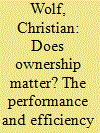

|
|
|
|
|
| Publication |
2009.
|
| Summary/Abstract |
This paper investigates the existence of ownership effects in the global oil and gas industry, i.e. whether there are systematic performance and efficiency differentials between National Oil Companies (NOCs) and privately owned International Oil Companies (IOCs). After discussing key issues of comparing 'State Oil' and 'Private Oil', I summarise important trends emerging from the dataset, which covers 1001 firm observation years over the period 1987-2006. Using panel-data regression analysis it is shown that NOCs significantly underperform the private sector in terms of output efficiency and profitability. They also produce a significantly lower annual percentage of upstream reserves, although this may not be an indication of firm efficiency. Overall, this paper suggests that a political preference for State Oil usually comes at an economic cost.
|
|
|
|
|
|
|
|
|
|
|
|
|
|
|
|
| 5 |
ID:
179288
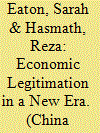

|
|
|
|
|
| Summary/Abstract |
Autocrats typically seek public support on the basis of economic growth-promotion and redistribution policies, and China is no exception. As important as these factors are for authoritarian resilience, we argue that economic legitimation is a more complex phenomenon than has previously been acknowledged. Beyond improvements in material well-being, citizens form judgements about the state's effectiveness in carrying out a variety of economic roles beyond growth promotion and they also care about the fairness of these market interventions. In this study, we use original survey data collected in late 2015 and early 2016 to evaluate Chinese citizens’ perceptions of two economic roles of the state that have been hotly debated in recent years: state ownership and market regulation. We find that while citizens view the ideas of state ownership and interventionist regulation in a generally positive light, suggesting a broad level of agreement in Chinese society about what economic functions the state ought to perform, perceptions of how the state actually carries out these roles are more mixed. Our results show that the urban young are especially inclined to critical evaluations, raising the question of how the Chinese Communist Party's legitimation strategy will fare under conditions of inter-generational value change.
|
|
|
|
|
|
|
|
|
|
|
|
|
|
|
|
| 6 |
ID:
092538
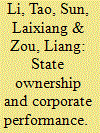

|
|
|
|
|
| Publication |
2009.
|
| Summary/Abstract |
This study assesses the impact of government shareholding on corporate performance using a sample of 643 non-financial companies listed on the Chinese stock exchanges. In view of the controversial empirical findings in the literature and the limitations of the least squares regressions, we adopt the method of quantile regression and report a robust and significant negative relation between government shareholding and corporate performance among, and only among, the more profitable firms. This new finding, which the conditional mean-focused regressions do not capture, suggests that while Chinese government still exerts influences on the performance of these partially privatized firms, the relationship parameter changes across quantiles of the distribution of performance variables.
|
|
|
|
|
|
|
|
|
|
|
|
|
|
|
|
|
|
|
|
|